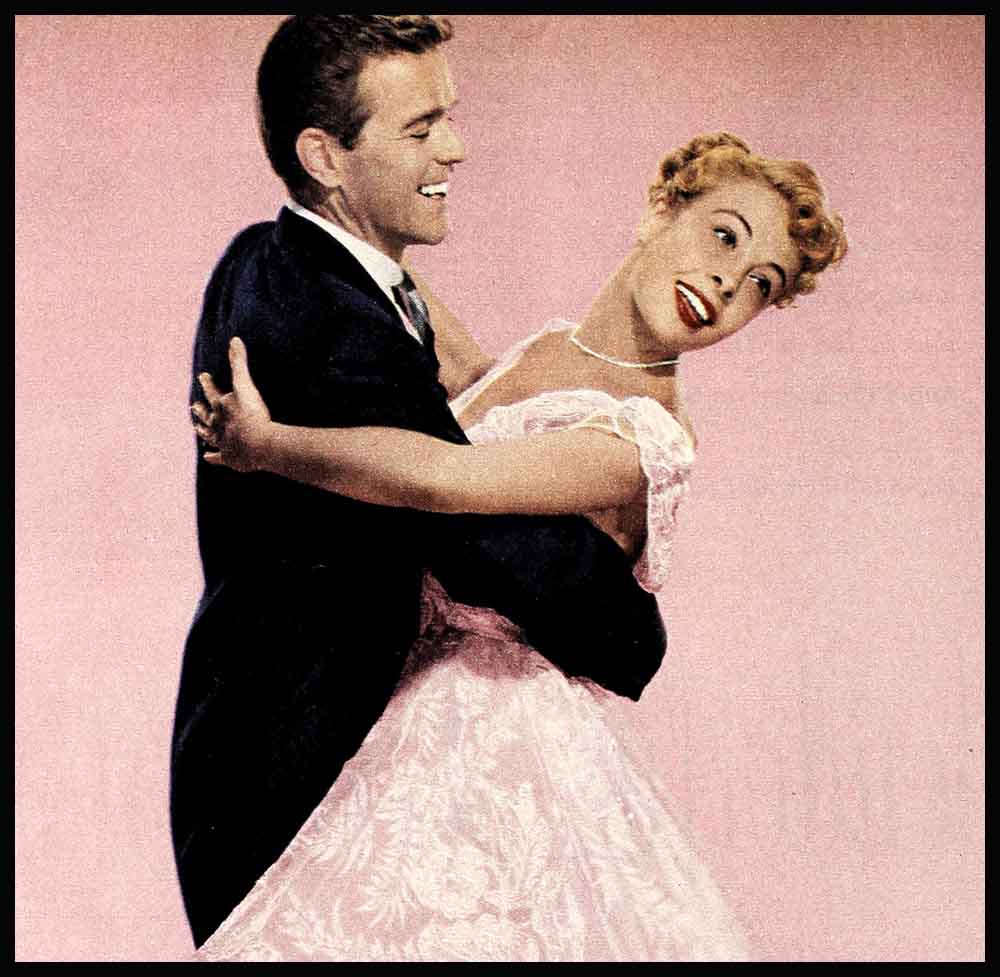
Just Right For Each Other
Some way Marge was managing to make away with her noodles and tuna. As some way Marge usually could. This was their big joke—that, no matter how tragic the timing, Marge could always eat—while Gower, as now, slowly starved across the booth from her. But a large tear trickled from a big brown eye from time to time.
Others lunching near them had no way of knowing why Marge wept, or that these two who were later to make terpsichorean history in Hollywood together were at their own dramatic crossroad, deciding the rest of their lives. Outside, New York crowds shoved back and forth, never realizing either that a bit of “Romeo and Juliet” was being enacted inside the restaurant. Quite a bit, in fact.
“You know the scene—where either the girl or boy gets a break and doesn’t want to leave the other. You’ve seen it many times—only better—on the screen. I was really playing it heavy,” grins Gower. “So heavy—”
“But so convincing,” sighs Marge.
She’d auditioned for “Allegro,” the Rodgers and Hammerstein show that was the talk of Broadway and the hope of every heart’s beat. Now Marge had been informed the choice had narrowed down to herself and three more. She was to stand by for the good word. And with mixed emotions she was standing by. But how could she ever leave Gower? Break up the team?
For weeks they’d been rehearsing feverishly in a little studio Gower had rented down in Greenwich Village. When Marge had mentioned casually that another dancer wanted her to work up an act with him, Gower had awakened to possibilities both romantic and rhythmic. “If you’re going to dance with anyone, you’re going to dance with me,” he’d exploded—and lost no time in effecting it.
When at last the act was ready, and they were booked into a hotel in Montreal, there was no money for costumes or the fare to get there. Then at the last minute, the mailman delivered a long envelope to Gower with a check inside, his severance pay from an unfulfilled M-G-M contract. With this, they’d paid the overdue rent on his hotel room and on Marge’s apartment. They bought her two costumes and paid for renovating a couple of old ones for him. They then borrowed thirty dollars from a friend for the fare to Montreal—and to their acclaim as a team. Now they were booked into the Palmer House in Chicago, but en route Marge had tried out for “Allegro,” never believing she’d have a prayer of a chance for the part.
There in the restaurant now, they were playing for all it was worth—yea, for more than it was worth—what might well be their own farewell scene.
There were tears on her side and heroics on his. This was her big chance, Gower kept insisting manfully. She must take it. While Marge kept sobbing she couldn’t break up their team. Then Gower said suddenly, almost wearily throwing the line away, “I don’t know what we’re worrying about. I’ll get another partner and we’ll open in Chicago. What difference will it make? You and I are going to be married anyway.”
Whereupon startled brown eyes met equally startled brown eyes. This was the first time he’d ever made any mention of marriage. They kept looking at one another, then they started laughing, and soon they were hysterical. Their waitress laughed with them. She was glad. They seemed to belong together, these two.
No doubt now in Marge’s mind what she would do. The next morning she would call Rodgers and Hammerstein and tell them she was sorry, but she just couldn’t accept the part. Years later she would still laugh, “I’ll never know whether I’d have gotten it or not. But I turned it down. I can always hold that thought—”
“And right over my head,”Gower grinned.
As usual, once the crisis was over, Gower’s appetite was fully regained. “Give me the noodles and tuna too,” he said recklessly, happily—ready to try anything.
“But you like noodles,” Marge says now, adding interestedly, “don’t you?”
“Only when they’re instigated by you,” he explains.
That even now, five happily married years later, Marge and Gower Champion find food for thought. Indicative of how very close they are is the degree of heart each harbors for a noodle. They’re two of a kind, dancing up that stairway to stardom on their own particular pink cloud, and a little wide-eyed to find themselves getting there so soon. They’re talented, hardworking, enthusiastic and thoroughly in love. Their every step, look and word intones just how much they belong to each other. They even speak in rhythm, one picking up the other’s sentence in mid-air, without ever missing a beat. And they look so much alike, they’ve been mistaken many times for brother and sister. And nobody’s gladder than Marge and Gower, that their resemblance is only accidental.
They’re today’s fabulous Siamese success-story, the Champions, and you photoplay readers who first voted them high in “Choose Your Stars” are a part of that story. Impressed by their star potential and by the avalanche of fan mail that followed their featured roles in “Show Boat” and “Lovely to Look At,” M-G-M executives decided to give them solo stardom in “Everything I Have Is Yours,” to be followed by their present starring roles as a dance duo in “Give a Girl a Break.”
Today the Champions may well ask what other breaks are life’s to give. Theirs is a breathless present and a brilliant future. All that remains is for Fate to allow them to go on up that ladder together, step by step.
This too is the concern of their friends and fans—whether success and stardom can separate this team on the screen. There’s nothing in their contract which insures against it. But as they’re both quick to say now, “Nobody has ever even suggested—can’t believe—I’m sure they wouldn’t—” still, it’s a sobering thought.
Although an Act of God would separate them— “If we have children, Marge will have to stop dancing. It would be impossible for us to have a child and both keep working. Not—”
“Not the way we feel about it,” Marge goes on quietly. “We just couldn’t leave them alone to be brought up by somebody else. You see—”
“We’re just not that kind of parents,” Gower ends. “That is—we wouldn’t be.” Individually, with their respective talent and enthusiasm, each would undoubtedly have found fame, but together, theirs is a sparkling success-story with all the laughter and conflicts of any backstage drama in which they play on the screen.
They themselves find their success hard to believe. “When we started working together we thought we might be good as a team. Our bodies worked well together, and something seemed to click between us. But we never thought what has happened would happen,” they say with happy wonderment.
Since childhood, their dancing paths have crossed. Gower was the prize dancing pupil of Marge’s father, Ernest Belcher, famous Hollywood teacher. They sat next to each other in History “B,” but at an age when either sex tolerates the other only as one of life’s more lamentable necessities. During high-school years they did have a few scattered dates, and recently Marge came across an old diary and noted after a lengthy, detailed account of an evening with Gower, her own comment, “Happy time!”
But Gower began his career with another partner and it was a whole war and many engagements later, before he got into step with Marge. And then, only against his own manager’s vigorous objections. “Are you going to dance with that fat little girl?” he said. “Yes,” Gower said angrily. “Yes! I definitely am.”
Now when Marge, a svelte one hundred two pounds, chats about how she’s always had to watch her weight, saying, “I’ve never been able to wear a cashmere sweater outside my skirt until now. I was so—” Gower listens until, thoroughly miserable hearing her run herself down, he can stand it no longer. “Now, Marge, I really don’t think you were ever like that,” he begins, but she interrupts conscientiously with, “Oh yes I was. Don’t you remember what your manager said? ‘You’re not going to dance with that—’ ” and Gower quickly changes the subject.
A far happier memory is their opening night at the Mocambo when they captivated all Hollywood with their own happy rhythm, music as refreshing, as breathless and as irresistible as first love.
But today Marge and Gower still consider their best performance the one they gave for an unsuspecting group of relatives on their own wedding day. They were married between bookings at Gower’s “Auntie Pat’s” in Hollywood, with Marge a misty old-fashioned vision in Gower’s mother’s wedding gown. They’d closed at the Palmer House in Chicago the Wednesday night before, flown to the coast Thursday, gotten the license Friday, and were marrying on Sunday. They were to leave that same evening for New York, arriving in time to rehearse Milton Berle’s television show—before opening for a long engagement in the Persian Room. “We were so tired we were a little hysterical,” they remember now.
But they forgot their weariness momentarily during the ceremony. For, as they say, they had a “real comedian-minister.” When he asked, “May I have the ring, please?” he got completely carried away. “Lovely!” he observed, then went right on with the ceremony, almost breaking them up. “He wore high-top, button shoes with five million buttons, and we were so fascinated we kept looking down at his feet throughout the whole procedure,”
“It doesn’t seem like five years, does it?” asks Marge, slowly fingering her ring. And the inscriptions inside both wedding bands which read, “Happy Time,” have been equally prophetic for their adoring public. For which they take small credit. “Work is fun, if you’re happy,” they both say now.
Between them, “Gower’s the choreographer and the boss,” Marge says readily, adding, “I wouldn’t have it any other way.” And nobody can tell you better than she can all the reasons why. Just how talented he is. How he won the Donaldson Award for the choreography in “Lend an Ear.” How good his dances were for “Make a Wish.”
“But Marge edits our routines,” Gower cuts in quickly, anxious for her credits to start rolling too. “When I get an idea, I get so excited it gets hold of me and runs away with me. After our accompanist, Dick Pribor, and I work on it a couple of days, then I do it for Marge. By then, I’m too close to it, but Marge comes in with a whole fresh point of view and I’m anxious for her reactions. If she says, ‘This doesn’t feel right here,’ or ‘This I don’t like,’ then I will really argue with her. If I’m strong enough to argue her down, I’ll believe I’m right.”
“Then I will accept it too,” says Marge. “For once I know Gower’s sold on it, it is right.”
Despite all of which, they agree that on occasion they’ve disagreed. “Not,” as Marge says, “intensively—but—”
“That first routine we ever did together, I thought it was horrible,” she laughs now. “But I said to myself, ‘Oh, well, we’ve just teamed up, I’ll go ahead and do it.’ It was only the biggest number we did.”
“What about our ‘County Fair’ number?” Gower recalls gallantly. “How right you were on that one! I wanted to fade out quietly at the end of it,” he explains, “but Marge thought this was too namby-pamby, and she was all for putting a big fat corny finish on it. So we finished corny, and it was a big smash.”
On the other hand, once in a while— “Remember the ‘Boy Meets Girl’ number? We both hated that one, and we were both right,” they say, wincing now.
And if you wonder what they do when they get home, after dancing all day long, doing a difficult, exhaustive routine like the roof-top number in “Give a Girl a Break”—whirling, turning, jumping from parapet to parapet to a mad, mounting rhythm—they smile, remembering, “This may sound crazy, but, well, we danced.”
“It was real funny. Gower put a stack of records on when we first got home—”
“Restful records. The kind you can relax or collapse and listen to—”
But the soft candlelight, the glowing fireplace, and the romantic strains of “All the Things You Are” were just too much for Marge. Wearing her comfortable red and green plaid brunch coat and bare of feet—“Our feet were so swollen we couldn’t even get our shoes on—” Marge had said, “Feel like dancing?”
“Um-m,” he said, meaning, “not necessarily, but if you want to, I’d be charmed—I think. Would you like to?”
“Then Gower put his arm around me and in our bare feet we crept around the room like we both weighed a ton. Once around. Then we sat down,” laughs Marge.
Other evenings when they’re not so tired, they’ll put on concertos and such. Then again, sometimes, “We go out on a ‘date’,” says Marge, “and we take in a movie on Hollywood Boulevard.” And as Gower says, “We have ‘surprise evenings,’ when I don’t tell Marge where we’re going. I just say, ‘Dress up’—then we may have dinner, go to the theatre, and wind up at the Mocambo.”
All of which bears out the Champions’ own feeling that marriage isn’t more difficult for a co-starring dance team. “On the contrary, it’s much easier,” they insist. “If one of us is tired, the other is tired. If one feels like going out, the other wants to go out too. Our moods always match. It’s a fine arrangement.”
And if a house could speak, their two-story, spacious white brick home high on a mountain with its own wedge-shaped view of Hollywood’s lights, and their feline choir of five assorted-blooded cats who share it with them, would chorus the same—these two belong together twenty-four hours of each day.
With the intensity of all in show business who’ve lived out of a suitcase for so long, Marge and Gower have spent three years painstakingly furnishing their first home. As they say, “We live with it and we love it, all of it.” Their house, complete with terraced gardens, a swimming pool, a rehearsal room in the basement, and their own happiness, is a gem of collectors’ items. A harmonious combination of mellowed modern and sentimental antiques which reflects the tastes of its owners.
“Actually, I didn’t like anything modern until I met Gower—”
“Funny, but I just couldn’t see antiques —until I married Marge—”
While it’s Marge who proudly invites friends to come up and see her etchings, it’s Gower who will keep on indefinitely paying for them. “They’re real,” she says proudly. “Genuine Goyas. Gower found them in an art shop and he’s been paying on them for months out of his private allowance. We both get ten dollars a week that we can spend—and no questions asked.” Gower will probably still be buying them when he’s as old as the etchings—well, almost. For weeks, he would drop by the shop every week and pay a few more dollars, until in a soft moment, the proprietor finally said, “You’ve paid quite a bit on them now. Why don’t you take them home to your wife?” As Gower observes, “He must be a real Champion fan. He thinks we’ll last.”
They insist the living room is a “Siamese brown” and Marge’s bedroom “Siamese blue,” and that both shades were inspired by their two Siamese cats, one of which is named “Gladys.” “We got so tired of hearing people say something’s ‘real George.’ We thought it would be nice to say it’s ‘real Gladys,’ for a change.”
Down in the den they use for a rehearsal room is their beloved piano they bought when they were living in a basement apartment in New York, and for which they blew their family bankroll of nine hundred dollars. “We were on a soul-satisfying binge at the time.” Dick Pribor, their friend and accompanist ever since those first days, will never forget how thrilled the three of them were and how they rushed home from the night club to see it when it was delivered. “We suspended a floor lamp from the ceiling for an improvised spot. This we focused on the piano, and we ate our hamburgers in the darkness, regarding the piano with soul-stirring wonderment.”
Take his word for it, the Champions haven’t changed since that basement apartment where they all worked so hard filling discarded apple-boxes with dirt and vitamin pills and plant food, trying to make a flower grow. “But there was just too much soot and ashes sifting down between the buildings. It never worked.” They’re the same refreshing pair. Marge still looks at the world and everything and everybody in it as though they’re brand new. And Gower, if he is of a different opinion, is still inclined to close one brown eye and go along with her.
“I’m much more introspective than Marge,” Gower will say in analyzing their differences. “I’m not as gregarious as she is either. Marge likes people and parties. And she talks more.”
“Yes, but you’re funnier—”
“That’s just because I wait for the punch line.”
Although sometimes Marge has cause to wonder at her courage in talking to people at all. “We’ve met so many people, so fast—you know the bit—‘I can’t remember your name, but I remember your face?’ Well I can’t even say I remember their faces,” she laments. On which occasions Gower gets her fast S.O.S., quickly rescuing her with, “I’m so sorry—you know my wife, Marge?”
A perfectionist in all things, Gower spent three years searching for the exact antique watch he wanted for Marge, who loves antique jewelry and who’s so proud of her watch that she can’t stand for anybody to ignore it. And there’s small chance that anyone will, considering the loud snap it makes when it’s opened. And considering the way Gower or some pal of theirs steps in as though on cue at any goodly gathering with, “What time is it, Marge?”
The Champions love to go dancing, but being a dance team, they insist, cramps their social style. Let them try a simple little waltz and suddenly they’re going it alone, with everybody else sitting down and watching. If they sit down. they’re accused of being high-hat. If they keep en, they’re accused of being exhibitionists. “If Gower asks another girl to dance she’s petrified, afraid she isn’t good enough. If a boy asks me to dance he’s petrified, afraid he’s not good enough. If he steps on my toes, he apologizes for it the rest of the evening.” Which is pretty silly, in Marge’s opinion, since Gower steps on her toes a lot of times. Also, once during a dance routine the toy cane he was employing glanced off her cheek, and gave her a very black eye.
They’ve had their dark moments, but one of the darkest they remember was sitting through the sneak preview of “Everything I Have Is Yours,” since they’re very probably the only two individuals in all Hollywood who doubted that they were ready for stardom. Despite their soaring fan mail and billing, Marge and Gower are still nervous and apprehensive. “Give a Girl a Break,” they say, will be “much better—Debbie Reynolds is in that one too.” Gower, he admits, has been nervous before, “but until that night— I’d never really had the shakes.”
“We had a ‘date’ for dinner, and we went to Romanoff’s,” says Marge, reliving every dark moment of it. “We were there by 6:30 p.m., so there wasn’t another soul in the place. We sat there all alone in our grandeur, shaking and trying to eat. Of course Gower didn’t eat a thing. all that day, friends of ours kept calling—inviting us to have dinner with them before the show, but we just couldn’t face anybody but ourselves.”
As for food, “We’re like Jack Spratt and his wife, anyway,” they chorus. “Marge takes out her nervous energy in eating, and I just slowly starve to death,” Gower says. Before and during that preview, Marge gained two pounds and Gower lost three. But Marge has lost so much weight recently, that for once she can afford to eat.”
“For the first time in my life, I can look at the dessert list and tell myself, I could have that, and not even want it. It’s such a satisfying experience. I used to be so—”
“Now Marge,” Gower cuts in miserably as usual, “you weren’t really!” But as usual Marge conscientiously reminds him she really was.
Marge believes in a protein diet. “But I seem to remember reading somewhere. or maybe it’s just because I want to believe it, that a little starch helps burn up the fat. So I take a little toast in the morning or maybe a noodle at night.”
“Sounds like a song title,” says Gower, snapping his fingers and breaking it down into a beat. “Just a little toast in the morning—and a noodle at night.”
“Yes, it does, doesn’t it?” agrees Marge happily. And anyone who knows them wouldn’t be the least surprised to see the Champions whirling off into a whole new routine on that theme.
The name is theirs legitimately. As Gower says, “Nobody would make up a name like that.” But they’ve earned it now too. Together they are Champions. Nobody can do better than that. And in more than one department. Like they promised when they were married, theirs is a very happy time.
Just how happy was apparent the other afternoon when Marge was having a fitting on a low-cut, sexy gown in the wardrobe department and Gower, who dropped by to pick her up, gave a long low wolfy whistle from the door.
“It’s moments like this, that I wish we weren’t married,” he sighed. “I’d like to start all over again.”
“Why,” Marge suggested, “don’t we just start from now?”
THE END
It is a quote. PHOTOPLAY MAGAZINE APRIL 1953

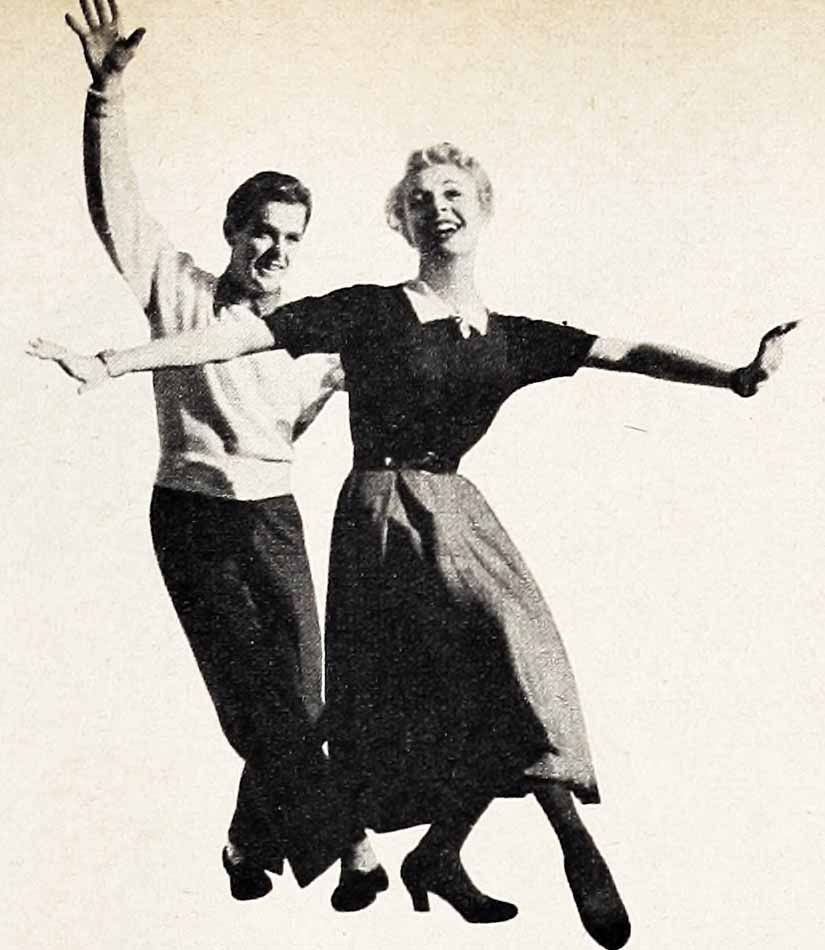
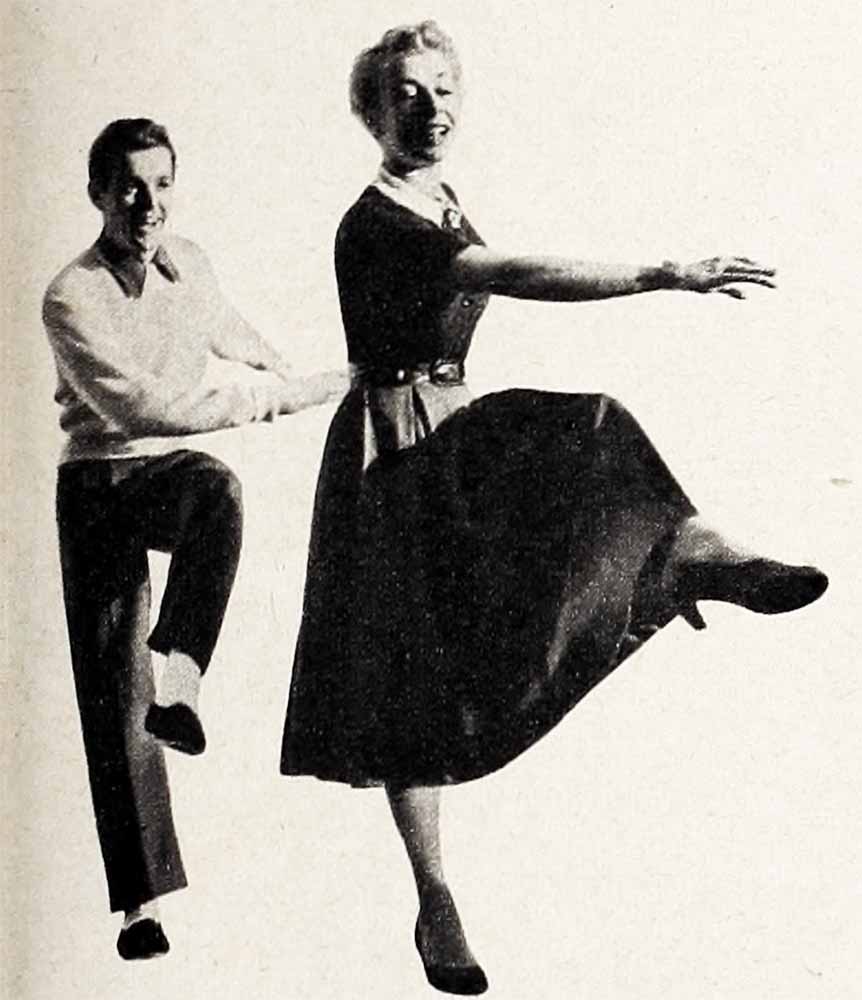
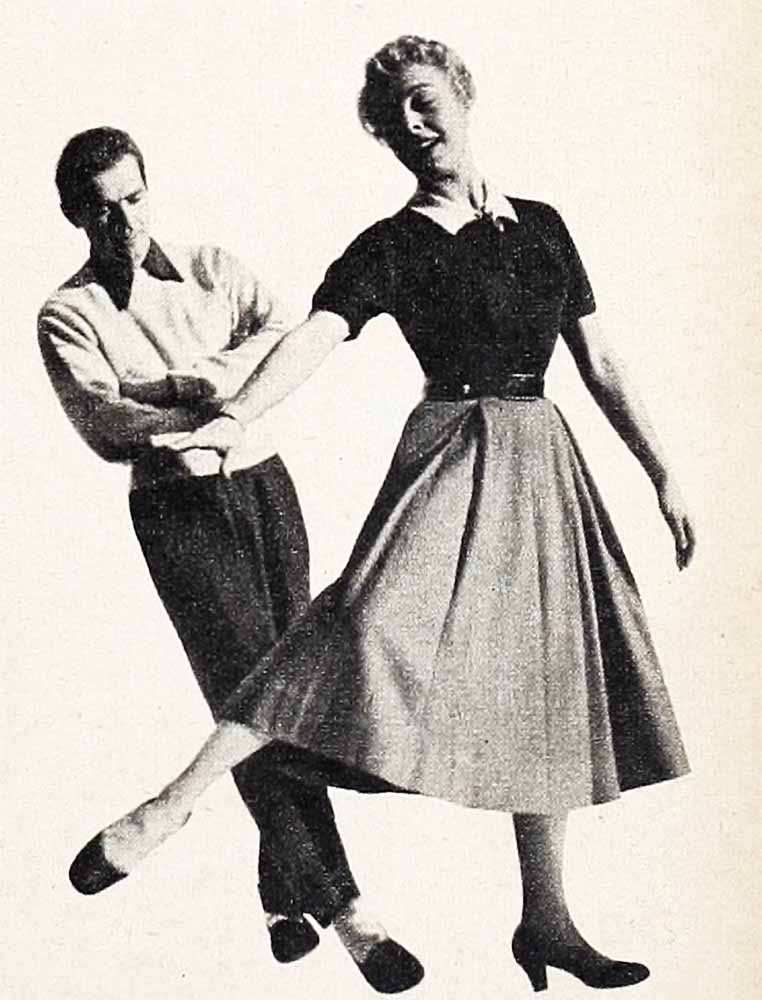
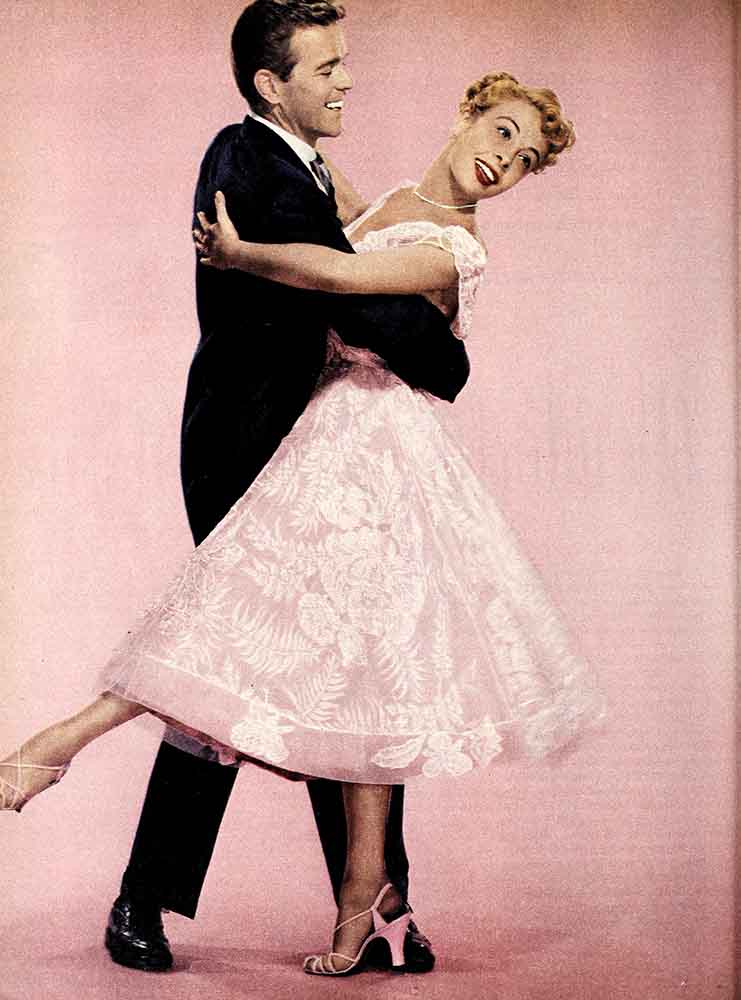

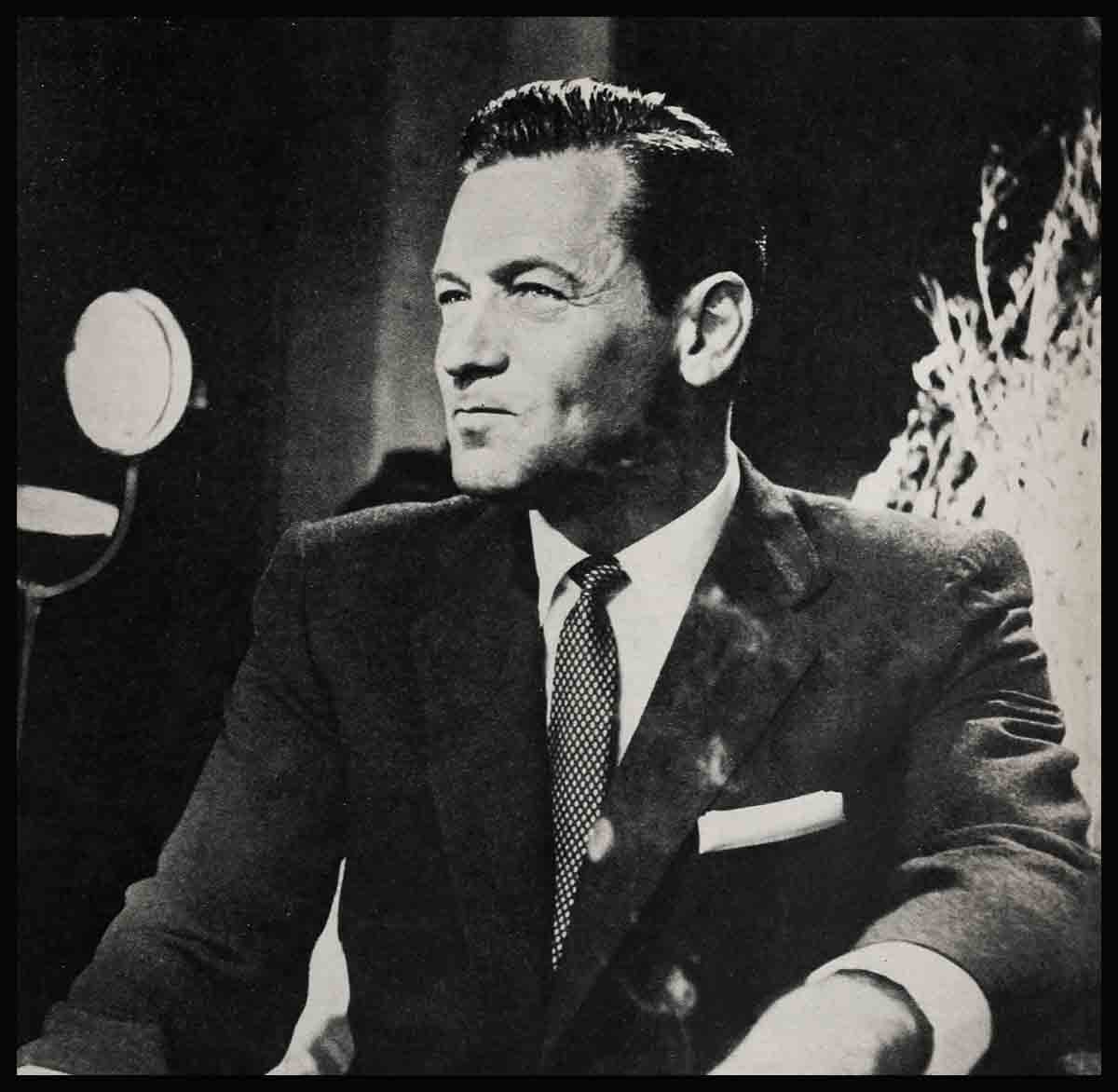

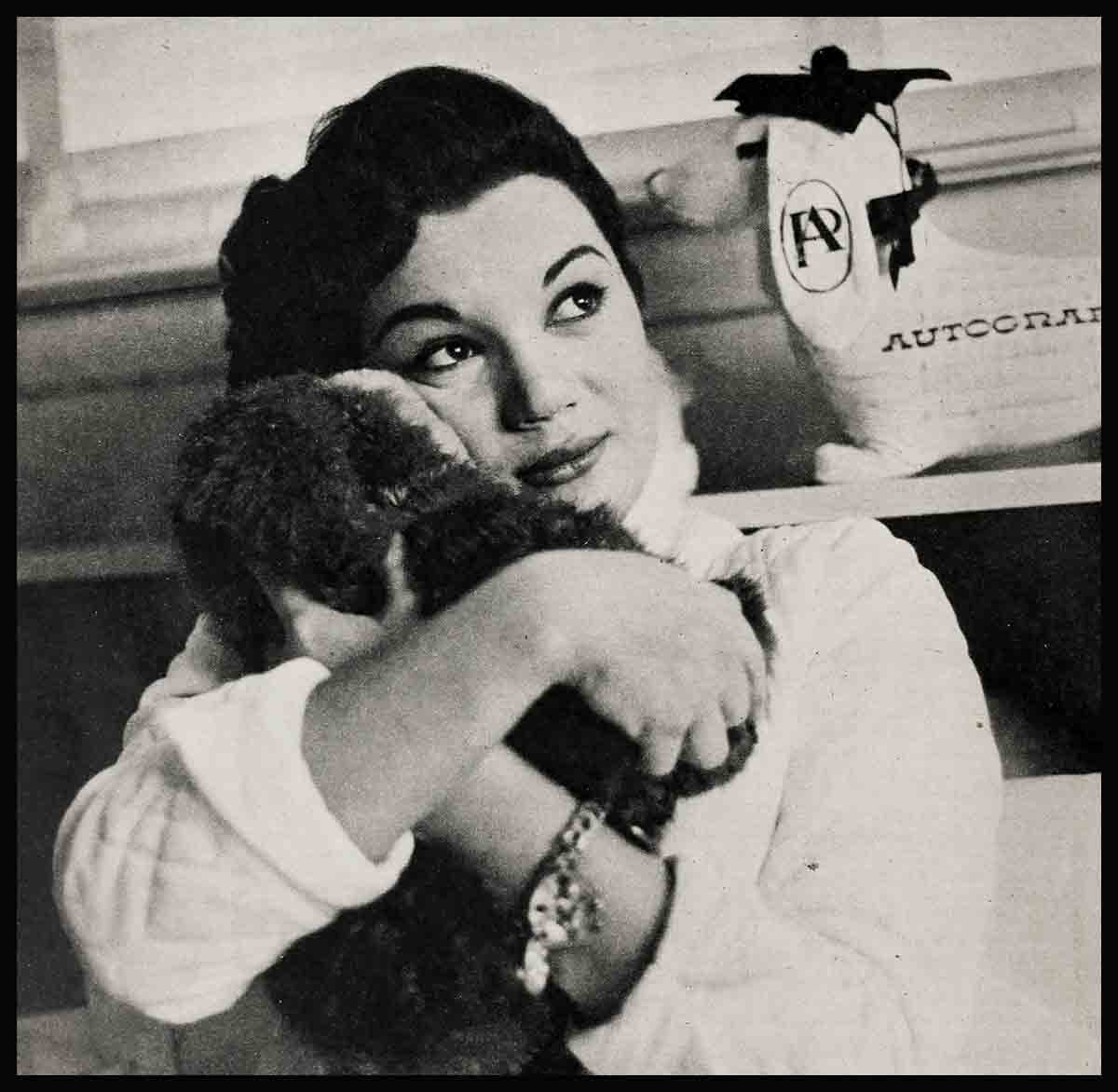
No Comments